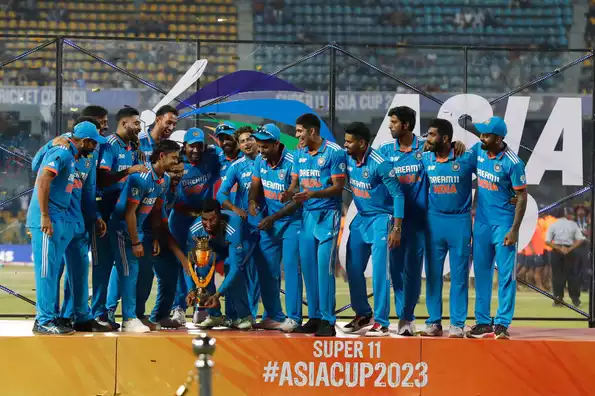The Asia Cup saga might be heading towards a resolution. While it's too early for definitive statements, a palpable sense of optimism now surrounds the tournament, a stark contrast to previous uncertainties fueled by India-Pakistan tensions.

Although concrete details are pending, a formal decision is anticipated next week. The Asian Cricket Council (ACC) is aiming to release the schedule for the six-team tournament by the first week of July, coinciding with its expected convention.
If everything proceeds as planned, the ACC is reportedly targeting a September start, potentially on September 10. This edition will be played in the T20 format. Participants include India, Pakistan, Afghanistan, Sri Lanka, Bangladesh, and the UAE. Promotional activities for the tournament are already underway.
The UAE remains the leading candidate to host the tournament, although discussions about a hybrid hosting model are also ongoing. While India is the designated host, the ACC previously decided that when India or Pakistan are scheduled to host the Asia Cup, a neutral venue would be utilized.
The tournament's future was clouded by the terror attack in Pahalgam in April. The situation worsened after India launched Operation Sindoor against Pakistan in May, raising serious doubts about the tournament. Calls for an Indian boycott of Pakistan in multilateral events also intensified. Currently, India does not participate in bilateral cricket with Pakistan. Discussions about a potential Indian boycott of Pakistan in global events were even rumored for the next ICC meeting.
Recent developments in world cricket suggest a shift in direction. The International Cricket Council (ICC) recently released schedules for two major events: the Women's ODI World Cup in India and Sri Lanka, and the Women's T20 World Cup in England. India and Pakistan are scheduled to compete in both tournaments - October 5 in Colombo, and June 14 at Edgbaston.
While officials from the BCCI, ACC, or ICC have remained silent publicly, cricketing ties between the two rivals appear set to continue, at least in global events. These matches generate significant revenue for global cricket. While India and the Board of Control for Cricket in India (BCCI) aren't necessarily dependent on this revenue, governing bodies like the ICC and ACC, along with their member boards, are.
Newer articles
Older articles
 Samsung Galaxy A35 5G and A55 5G: Full Pricing and Specs Revealed
Samsung Galaxy A35 5G and A55 5G: Full Pricing and Specs Revealed
 Warning Signs: 5 Clues Your Body May Be Signaling Prediabetes
Warning Signs: 5 Clues Your Body May Be Signaling Prediabetes
 Expert Tips to Help Kids Sharpen Focus and Combat Distractions
Expert Tips to Help Kids Sharpen Focus and Combat Distractions
 SA20 Teams Allowed Up to Six Player Retentions, Enhanced by New RTM Card and Increased Salary Cap for Upcoming Auction
SA20 Teams Allowed Up to Six Player Retentions, Enhanced by New RTM Card and Increased Salary Cap for Upcoming Auction
 Brain's Eye View: Study Shows We See the World 15 Seconds in the Past
OR
The 15-Second Delay: How Your Brain Creates a Seamless, But Delayed, Reality
Brain's Eye View: Study Shows We See the World 15 Seconds in the Past
OR
The 15-Second Delay: How Your Brain Creates a Seamless, But Delayed, Reality
 Cervical Cancer: Don't Ignore These 5 Subtle Warning Signs
Cervical Cancer: Don't Ignore These 5 Subtle Warning Signs
 Science-Backed: 5 Simple Daily Habits for a Healthier Heart
Science-Backed: 5 Simple Daily Habits for a Healthier Heart
 Shimron Hetmyer's Last-Gasp Six Stuns MI New York, Orcas Complete Record MLC Chase
Shimron Hetmyer's Last-Gasp Six Stuns MI New York, Orcas Complete Record MLC Chase
 Oral Cancer: Spotting the Signs, Understanding the Risks, and Why Early Detection is Critical
Oral Cancer: Spotting the Signs, Understanding the Risks, and Why Early Detection is Critical
 Infrequent Bowel Movements: When Is It Time to Worry? A Guide to Healthy Digestion
Infrequent Bowel Movements: When Is It Time to Worry? A Guide to Healthy Digestion